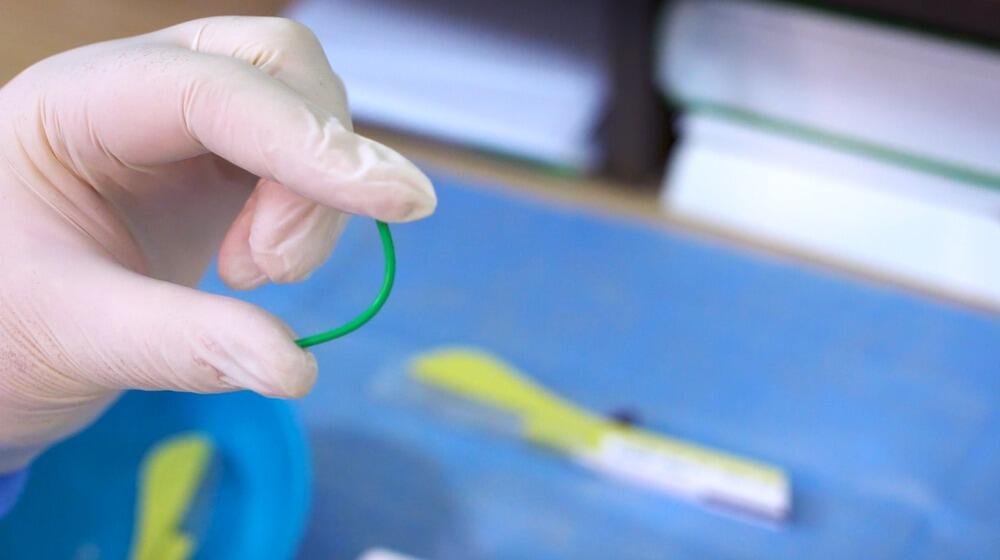One of the most effective modern contraceptive methods is available for women in the Republic of Moldova for the second consecutive year. The contraceptive implant, which has an effectiveness of over 99% in preventing unplanned pregnancies, is offered for free to individuals from 12 population categories by visiting their family doctor in their sector/locality.
In May 2024, Ina C., a 39-year-old woman from a suburb of Chișinău, became one of the women utilizing this method. After the birth of her fifth child, she and her husband decided to opt for an effective and long-term contraceptive method to prevent further pregnancy. Initially, her obstetrician-gynecologist informed her about the contraceptive methods available in the Republic of Moldova, and together they discussed which method would be most suitable. Ultimately, she chose the contraceptive implant—two small, flexible plastic rods about the size of a matchstick, inserted under the skin in the upper arm.
"The procedure was simple, quick, and painless, thanks to local anesthesia. I didn't have a fever or any adverse reactions. I only felt a little pain in the arm area that day. That's it. It's not visible; it's as if I don't have it. Until now, I was dealing with irregular menstrual cycles. Since May, after the implant was inserted, there have been no such problems. When I need to choose a contraceptive method again, I will choose the implant. I also recommended it to my sister-in-law to go to the doctor and request it," says Ina C.
The contraceptive implant contains only one type of hormone (progestogen) and can be used by many women, including those who are breastfeeding or cannot use estrogen-based methods. Once inserted, the implant is effective for a period of 3 to 5 years and does not require daily administration or additional visits to the doctor.
According to Victoria Ciubotaru, an obstetrician-gynecologist at the Center for Reproductive Health and Medical Genetics and Coordinator of the National Program on Sexual and Reproductive Health and Rights, the contraceptive implant was registered in the Republic of Moldova in 2020 and is one of the contraceptive methods provided free of charge from the state budget for 12 vulnerable population groups. In 2023, 100 implants ("Levoplant") were purchased for women from these 12 vulnerable groups, and this year, based on an analysis of women's needs and preferences, over 400 implants were purchased.
Currently, the contraceptive implant can be obtained for free at the 41 youth-friendly health centers (Youth Klinic), reproductive health clinics, and primary healthcare institutions. Based on eligibility criteria developed by the World Health Organization, the doctor initially assesses whether the contraceptive method is suitable for the woman based on her health status. If the woman falls into one of the 12 population categories, she will receive the implant for free, along with the necessary medical assistance for its insertion or removal.
"Over the past two years, about 300 obstetrician-gynecologists from across the country, including from the left bank of the Dniester, have been trained in contraceptive counseling and the use (insertion and removal) of the contraceptive implant," said Rodica Comendant, an obstetrician-gynecologist and director of the Center for Training in Reproductive Health.
"Women who do not belong to the 12 population categories can purchase the implant at pharmacies or order it from certain suppliers if it is not available at pharmacies at that time. They can then take it to their local gynecologist. Following the latest review of tariffs for medical services, the cost of inserting an implant is similar to that of inserting an intrauterine device (IUD)—a little over 200 lei," Victoria Ciubotaru added.
In the Republic of Moldova, access to contraception remains an unmet need for many individuals. According to the results of the Generations and Gender Study 2020, about 17% of women of reproductive age (15-49 years) have an unmet need for contraception, which is approximately twice as high in rural areas (20.2%) compared to urban areas (11.9%).
According to medical staff, in order to prevent unplanned pregnancies, some women from vulnerable groups resort to other methods, such as vinegar, lemon juice, and wormwood infusion, which are harmful to reproductive health.
On World Contraception Day, marked on September 26, UNFPA reminds us that family planning and access to contraceptive methods are fundamental human rights. Every individual has the right to information and services to plan a pregnancy at the right time, thereby planning their future.





